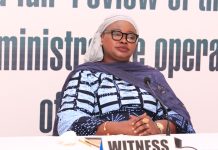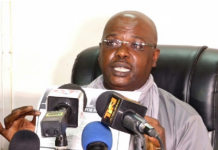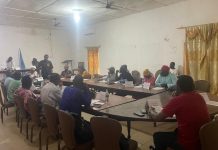By: Kebba AF Touray
The Gambia Hajj Commission appeared before the National Assembly’s select committee on Lands, Regional Government, Ombudsman, and IEC.
The meeting was for the commission to update the committee on its preparedness for the upcoming 2024 Hajj pilgrimage.
During the briefing, Secretary-General Foday Ceesay emphasized the commission’s preparedness despite challenges.
He expressed gratitude for the support received from commissioners, staff, the Ministry, the Office of the President, and the Central Bank of the Gambia. Ceesay reported that 60% of services had been successfully processed through the E-system, with significant cooperation from operators.
Ceesay outlined the hajj package rates of the travel agencies, which he said is calculated based on the Central Bank of the Gambia’s exchange rate of 67.25, for the 2024 Hajj season.
He outlined that the said rates of each of the travel agencies are as follows:
Gambia International Airline: D 498,995
Amana Travel and Tours: D 523,474
Banjul Travel Agency: D 524,550
Alfaz Travel Agency: D 531,275
Maya Global Travel Agency: D 529,795
Crossbreed Travels: D 529,930
Continental Travels: D 530,131
Alhuda Travel Agency: D 531,275
Tivaouane Travel and Tours: D 531,275
Groupo Soninkara Travel Agency: D 531,275
Orbit Travel Agency: D 531,275
Algasimou Travel Agency: D 531,275
Travel Express Agency: D 531,275
He told the committee “These figures were finalized after the Commission’s thorough review of all operator packages, which initially peaked at GMD 575,000”.
Ceesay highlighted the commission’s adherence to Saudi regulations, emphasizing that all financial transactions must go through the Office of National Hajj Commission. He explained the process of fund transfer and payment to service providers.
“The Commission opened an account in Saudi Arabia where all funds are transferred for further transferr to the E-system of Operators to pay their service providers, e.g., Hotels, catering, Mina Service, Zone fee, etc.” he told the NAMs.
He said the Commission faced a setback, missing the Saudi Ministry of Hajj and Umrah’s first payment deadline (February 25th, 2024) due to operators’ reliance on pilgrim payments to meet their financial obligations.
“However, most of the operators solely rely on the payment received from Pilgrims, without which, they cannot make any payment. This has caused the lateness of meeting the first deadline set by the Saudi Ministry of Hajj and Umrah,” he said.
Ceesay also noted that the Commission, with assistance from the Ministry and the Central Bank, provided USD liquidity to operators for immediate payments through the E-system, particularly for Mina tent allocations. However, delays in these payments resulted in the loss of the preferred Zone 2 location at Mina, relegating the Gambia’s allocation to another zone.
“It is important to note that Hajj is organized and managed by the Saudi government; therefore, they make guidelines and rules to be followed by all countries. This year, the Mina tent allocation is based on first come, first served. The Gambia has signed for Zone 2 at Mina, but because of the delay in payment, we could not get Zone 2; instead, we are located in Zone 4,” he said.
Ceesay informed the committee that the scheduled departure of the first flight for the 2024 Hajj is on June 1, 2024.
Addressing challenges in Saudi Arabia, Ceesay raised concerns about an outdated ambulance and inadequate financial support from the Ministry. He highlighted the need for a new ambulance and additional funding to cover expenses.
“Our ambulance is an outdated one. We cannot use it in Mina, even in the cities. Sometimes we face issues with the police because it is an outdated one. We have spoken about this, and we are working on it. We don’t know whether, in the next budget, you can (National Assembly) work on it so that we can get an ambulance in Saudi Arabia because it is a very big challenge we are facing right now,” he outlines.
The Secretary-General also highlighted the financial constraints faced by the Commission, noting that the Ministry’s funding does not fully meet its operational costs. He drew attention to the disparity between the Commission’s extensive responsibilities and the financial support provided.
Reflecting on the previous year, he mentioned that the Commission did not receive any financial grants. However, this year marked a change, with an allocation of D1.5 million. Despite this, there is anticipation for additional funds to adequately cover all expenses, as their current financial means fall short.
“We don’t also have a utility car in the Gambia, which is also part of our challenge when we have programs to go to; we use our Umarah’s car, but the most important one is the ambulance in Saudi Arabia,” he said.
He expressed gratitude to the support his commissioners, Staff, the line Ministry, the office of the President, and the Central Bank of the Gambia is providing to them, adding 60% of all services they offer have been successfully paid in the E-system, with the cooperation of the operators.
He said that despite their challenges, the said supports have contributed significantly in overcoming their challenges in executing their hajj activities.
He expressed gratitude for the support received from commissioners, staff, the Ministry, the Office of the President, and the Central Bank of the Gambia. Ceesay reported that 60% of services had been successfully processed through the E-system, with significant cooperation from operators.




















